Home
What
Story and Why
How
to
Tell
What's
New
Blog
Life
Story Resources
Research
is Fun
Get
Started
Highlight
Site
Sample
Writing
Free
Newsletter
Articles
About
Contact
Us
Privacy
Terms

|
The
"Your Life is Your Story" Blog Archives
Read
about
quality family history and life story news, views, methods, products,
links, services
...and whatever else catches the fancy of personal historian Tom Gilbert
July
2015
current
blog entries
blog
archive
index
Fear Might Be Holding You Back from Telling Your
Story
July 30, 2015
Fear can be an obstacle to your life
story writing. But it need not be. Whenever you are afraid it is always
helpful to identify just what those fears are and see how much they are
based in reality and how many of them turn out to be just your
imagination running away with you. I find it beneficial to remember the
acronym F.E.A.R: False Evidence Appearing
Real.
| read
more |
An
Audio Message from Her Father - Years After His Death
July 27, 2015
We all crave hearing our parents say they love us. It's a
basic need of every human; we all want to love and be loved.
Getting that affirmation is sometimes a long time coming. For Johanneke
van den Bosch it hearing her father's voice and how missed her
had
an incredible impact. That's because she heard it years after he died!
Her father recorded a cassette message that ended up forgotten in her
half-brother's cupboard for over 28 years. It was a special
gift
for it to be found and presented to her in person when she made one of
her infrequent visits. I found this cowbird
story particularly moving.
No
Writer's Block With a Memory List
July 22, 2015
Have you ever used a Memory
List for your lifestory writing? It's a terri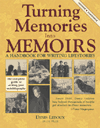 fic
tool. I've always recognized that it is important to outline and create
notes when you are preparing to write anything, be it an article, essay
or memoir. But the real value of a systematic Memory List became
clearer to me when I read Turning
Memories Into Memoirs by Denis Ledoux. fic
tool. I've always recognized that it is important to outline and create
notes when you are preparing to write anything, be it an article, essay
or memoir. But the real value of a systematic Memory List became
clearer to me when I read Turning
Memories Into Memoirs by Denis Ledoux.
I was presenting to some elders at a retirement community today and I
shared with them about using a memory list and its value. I emphasized
that with an extensive list you won't ever have writer's block. When
you are unsure what to write about simply refer to your list and
something will jump out at you to write about.
A memory list contains words and short phrases about important events
and recollections from your life journey. It could be the first
baseball game you played in, getting a new bike for your birthday, the
day your first child was born, going 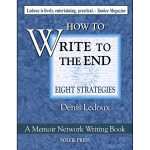 on
a trip to Paris, meeting an old friend over coffee and any number of
other significant things. Collecting these memories over time and
clustering them in your 3-ring binder will help you recall other
memories. The core memories from this list can form the basis of your
lifestory. on
a trip to Paris, meeting an old friend over coffee and any number of
other significant things. Collecting these memories over time and
clustering them in your 3-ring binder will help you recall other
memories. The core memories from this list can form the basis of your
lifestory.
Denis Ledoux has expanded on the idea of using a memory list with his
recently released Write to the
End (available from The Memoir Network).
I'm enjoying reading it and picking up new tips. That's one of the
things about working with writing and personal history - there is
always more to learn and discover!
Archiving
Family History Documents - Saving Your Stuff
July 21, 2015
Historical documents such as letters from presidents, legal documents,
treaties and so on form the basis of much of the history of the world.
In school we refer to them as "primary documents". These are important
artifacts to preserve.
Just as important to your personal and family history are letters,
photos, diaries, certificates and the like. Have you given any thought
to how you will preserve this important "stuff"?
Tom Taylor has written about this topic for the APH Blog. In 20
Reasons Why You Should Write Your Family History: #20 You’ll
archive & preserve the documents on which your research is
based (link) he
discusses some steps you can take. Organizing, categorizing,
inventoring and then refining your family history assets can take time
and it might seem like an overwhelming task. But if you don't curate
this stuff you risk it being lost, and along with it perhaps important
pieces of a family history.
Two
Sides of Technological Light
July 16, 2015
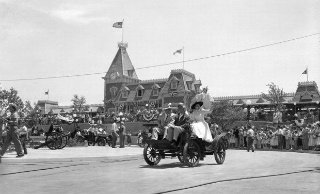
It has been called "The Happiest Place on Earth". Disneyland
opened
60 years ago and ushered in a new age. This park gave birth to
a
new type of theme park, one built on both fun and imagination.
Walt Disney's dreams became real in a Tomorrowland where park visitors
could experience the future now.
Ten years and a day earlier, another new age was birthed, the Atomic
Age. The 70th anniversary of the explosion of the first atom bomb
happened in the middle of a desolate desert in New Mexico. The light of
Trinity
burst upon the morning brighter than any sunshine. Scientists weren't
exactly sure what would happen, but they knew it was a bigger bomb than
there had ever been.
Two sides of technological light. The awful light of a nuclear
explosion; the warm light of a place where millions have
enjoyed
special memories. It's an odd world we live in, so full of both
goodness and horror. That's how life is, though. It is not all
sweetness and light, but it is also not bitter and dark. All the varied
spectrums of color shine forth in a ray of light.
3
Billion Mile Journey to Pluto
July 15, 2015
New Horizons, a spacecraft launched 9 years ago, has traveled over 3
billion miles across our solar system and historically made a relatively close flyby
of Pluto. It is an accomplishment that some scientists are equating
with man's first footprint on the moon and the landing of the Curiosity
rover on Mars.

The probe's flyby has occurred exactly 50 years after Mariner 4 made
its flyby of Mars and sent back photos of another planet taken
close up from space. That was a first and now the United States has
completed another first with this mission, sending a space probe past
every planet in our solar system, from Mercury to Pluto . I
find it
fascinating.
Pluto has been a controversial planet with a debate in recent
years over whether it should be classified a dwarf planet or not.
Regardless, it is one of the significant bodies in space in our
celestial neighborhood. But 3 billion miles away - what a vast distance
to contemplate! It should provide some perspective and remind us that
while we may be important (we are) and that our lives have significance
(they do) we are but a small part of creation and our time is but a
blip. Space and time and each breath we take, it is all magnificent and
I, for one, am grateful to be living in a time when we can witness such
historic occasions as receiving photographs from a space probe in the
outer reaches of our solar system.
The
Value of a Privately Published Life Story Book
July 13, 2015
There is no mistaking the growing popularity of memoir. The combination
of technology and interest in our personal histories has led to an
explosion of life story publishing. It's a rare feat, however, to have
a memoir picked up by a publisher and an even rarer occurrence when
that memoir sells.
Although your story might not be on sale to the masses doesn't lesson
its value. Many people are quite content writing and privately
publishing their memoirs for the benefit of their own reminiscence and
to pass on their stories to family and friends. William Novak, a noted
ghost writer who has assisted on memoirs for Lee Iacocca, Magic
Johnson, Oliver North, Nancy Reagan and others has written an opinion
piece for the New York
Times
in which he espouses the value of privately published life story books.
He's had personal experience being the writer for such projects. In Writing Books Very Few Will Read
he lists some of the meaningful reasons. This endorsement of the type
of work I and other personal historians engage in is important
validation. Even more important is that it reinforces many powerful
reasons, including preserving your historical record, passing along
values, the pleasure of reflection and the satisfaction gained from
knowing you will be remembered by future generations.
Family
History Stories Have a Wide Impact
July 9, 2015
Thanks to the efforts of Life Stories Australia
over 2000 life stories from everyday Australians have been gathered and
preserved. The impact of these stories is wider than you might imagine.
Families learn about their ancestors. People learn more about their
history. We all hunger for stories that satisfy a deep hunger to know
who we are and where we come from.
Annie Payne, a very active, knowledgeable and thoroughly delightful Personal
Historian based in Adelaide,
Australia has been instrumental in helping seniors preserve their
personal histories through Life Story Circles and the Life Stories
Australia not-for-profit organization she founded in 2012. She's been a
firsthand witness to the power of these stories and she's helping
create a lasting legacy for Australians. Her recent post for the APH
Blog (part of the twenty reasons why you should write your
family history) lists some examples of elders' history. Check out reason
#18: It will have a wider impact than you might imagine.
#APH20
Photos and Stories
July 6, 2015
A picture is worth a thousand words, or so goes the old adage. That is
a lot of writing for one image. Most of us won't spill that much ink.
But photographs do evoke memories and present opportunities to tell
stories.
Some people are good storytellers. They have a gift for
speaking,
for weaving tales that hold listeners spellbound. Others are
talented at capturing a story through photographs that convey something
magical and mystical. We view it and thoughts and words come to mind.
Robert Frank, called "the most influential photographer alive" by
Nicholas Dawidoff in his insightful NY
Times article, The
Man Who Saw America,
often literally shot from the hip to capture the spontaneity of life.
His photographic survey from sixty years ago, "'The Americans", is
considered a masterpiece. Bruce Springsteen says the
book created
an entire American identity, that the book speaks volumes
beyond
its 83 pictures.
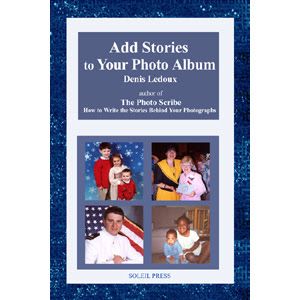 If
you are creating a memoir or family/personal history it helps to
include photos. Those photos speak to the reader visually, but can be
enhanced with some well written stories. Life story specialist Denis
Ledoux is the author of Add
Stories to Your Photo Album. It is being offered as a free
Kindle download on Amazon July 6. After today will be only $2.99 (link).
Ledoux is the author of the celebrated, Turning
Memories Into Memoirs, and provides a wealth of
life writing information and resources on The
Memoir Network site. If
you are creating a memoir or family/personal history it helps to
include photos. Those photos speak to the reader visually, but can be
enhanced with some well written stories. Life story specialist Denis
Ledoux is the author of Add
Stories to Your Photo Album. It is being offered as a free
Kindle download on Amazon July 6. After today will be only $2.99 (link).
Ledoux is the author of the celebrated, Turning
Memories Into Memoirs, and provides a wealth of
life writing information and resources on The
Memoir Network site.
Grateful
Dead at 50 and the Fare Thee Well Shows
Juy 2, 2015
It was fifty years ago that the Grateful Dead formed and it has truly
been a long, strange trip for this iconic American rock group. Although
Jerry Garcia, lead guitarist and founding member, passed away 20 years
ago the influence of the music and various incarnations of live music
from the surviving members has carried on over the years.
However, they have not performed officially under the name of the
Grateful Dead since Jerry died in 1995.
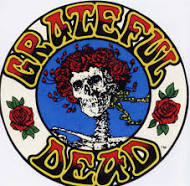 That changed a few days ago with a couple of
shows in Santa Clara, California. The final three shows of this
short Fare Thee Well
tour get underway Friday, July 3 and continue through the Independence
Day holiday weekend. Tickets sold out in a flash, but pay-per-view
events at theaters or in your home are another way people can see the
concerts. That changed a few days ago with a couple of
shows in Santa Clara, California. The final three shows of this
short Fare Thee Well
tour get underway Friday, July 3 and continue through the Independence
Day holiday weekend. Tickets sold out in a flash, but pay-per-view
events at theaters or in your home are another way people can see the
concerts.
The core four (the surviving original members Bob Weir, Phil Lesh,
Mickey Hart and Bill Kreutzmann) will team with keyboardists Bruce
Hornsby and Jeff Chimenti and play at Soldier Field in Chicago. It's a
fitting venue, the site of the last Dead show with Jerry in July of
1995. It's hard to imagine a Dead show without Jerry Garcia, but Trey
Anastasio, lead guitarist for Phish and someone who knows well the
musicology of Garcia, is a good choice and he received favorable
reviews from the California shows. I imagine he'll become more
comfortable and more a force in the band with these next shows.
My first Dead show was in Norman, Oklahoma in 1977. I was in college at
the University of Oklahoma. My roomate, John Florence, invited me along
and it was pretty mystical. A few of us made a road trip a couple of
days later to see the Dead perform at SMU in Dallas. As the saying
goes, "There is nothing like a Grateful Dead show!" and that was
particularly true for that Dallas show. It was the best of the many
shows I would experience, although there were some pretty good ones
through the years.
My buddy John and I not only went to college together, we also worked
in radio broadcasting and we've got some other shared life experiences
that are a part of our stories. John still works in radio, at KRCL, a
community FM in Salt Lake City, Utah. Right now he and some of his
friends are in Chicago for the historic event. It's going to be an
amazing adventure and I look forward to hearing about it.
Music, particularly great live music, can have lasting impacts on us
emotionally and mentally. I've seen a lot of good concerts in my life.
There is something special about Dead shows that transcends just a
musical experience. The audience, the environment and the musicians are
all part of Something Bigger. On occasion the band is able to tap into
what has been referred to at the "eternal moment" and they are all
channeling music outside of space and time. I realize that sounds
cosmic, but I've been there when it's happened and felt it.
|













 That changed a few days ago with a couple of
shows in Santa Clara, California. The final three shows of this
short
That changed a few days ago with a couple of
shows in Santa Clara, California. The final three shows of this
short